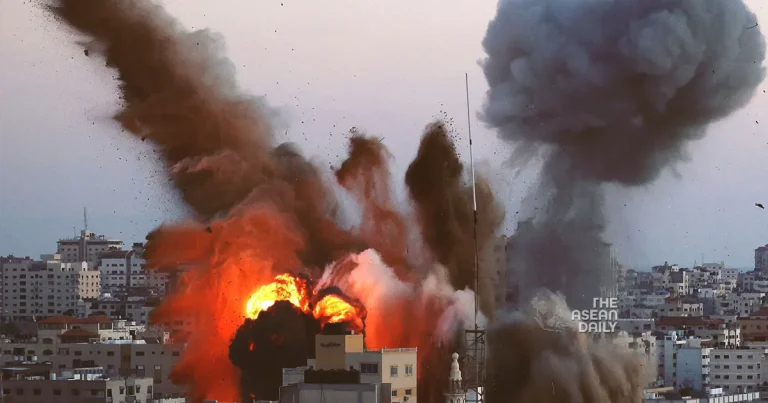6-11-2023 (GAZA) Despite mounting international pressure for a ceasefire, Israel has firmly declined, announcing the encirclement of Gaza City by its forces. This decision comes as the top US diplomat, Antony Blinken, scrambles to mitigate a crisis that threatens to further escalate tensions in neighboring Lebanon.
On Sunday, Gaza endured what Palestinian news agency WAFA described as an “unprecedented bombardment” from Israel. Simultaneously, Palestinian telecommunications company Paltel reported the resumption of communication and Internet service disruptions.
Amid the escalating conflict, Palestinian Authority President Mahmoud Abbas met with US Secretary of State Antony Blinken during his unannounced visit to the occupied West Bank. During this meeting, both leaders echoed international calls for an immediate ceasefire.
However, Israeli Prime Minister Benjamin Netanyahu insisted on the release of hostages held by Hamas as a precondition for any ceasefire, stating, “There will be no ceasefire without the return of the hostages. This should be completely removed from the lexicon.”
Antony Blinken later arrived in Ankara for further discussions on the Gaza conflict with Turkish Foreign Minister Hakan Fidan. Earlier, in southern Turkey, police used tear gas and water cannons to disperse hundreds of protesters attempting to storm an air base housing US troops in a pro-Palestinian rally.
The encirclement of Gaza City was confirmed by an Israeli military spokesperson, who stated, “They reached the coast in the southern part of Gaza City and they encircled Gaza City.”
Tensions between Israel and Lebanon escalated further when an Israeli strike in the south of Lebanon resulted in the deaths of three children and their grandmother, as reported by Lebanese authorities. Israel’s chief military spokesperson explained that this strike was in response to a missile attack on Israeli tanks, which had resulted in the death of an Israeli citizen. Additionally, a Hezbollah drone was shot down.
In retaliation, Hezbollah fired rockets at the town of Kiryat Shmona in northern Israel, causing sirens to sound across central Israel. While some areas in and around Tel Aviv were reportedly struck by rockets, no casualties were reported.
Hamas-controlled Gaza continues to suffer the brunt of the conflict, with health officials reporting that over 9,770 Palestinians have been killed in the war, which began when Hamas launched a surprise attack on southern Israel on October 7. Israel has reported the loss of 31 soldiers thus far.
The Maghazi refugee camp in Gaza was particularly hard-hit, with at least 47 people killed in an overnight strike. A resident described the horrific aftermath, saying, “All night I and the other men were trying to pick the dead from the rubble. We got children, dismembered, torn-apart flesh.” When questioned about these accounts, the Israel Defence Forces (IDF) stated that they were in the process of gathering details.
In another attack, 21 Palestinians from a single family, including women and children, were killed in overnight strikes, as reported by the health ministry. The IDF did not provide a comment on this incident, and Reuters could not independently verify these accounts.
During his meeting with Antony Blinken, Palestinian Authority President Mahmoud Abbas urged an “immediate ceasefire” from Israel, emphasizing that Palestinians were facing a war of “genocide and destruction.”
International pressure for a ceasefire has been mounting. Foreign ministers from Qatar, Saudi Arabia, Egypt, Jordan, and the United Arab Emirates urged Blinken to persuade Israel to agree to a ceasefire during a meeting in Amman. Pope Francis also joined the calls for peace, calling for humanitarian aid and assistance for the injured in Gaza.
However, Antony Blinken expressed concerns that a ceasefire might benefit Hamas by allowing them to regroup and launch further attacks. Instead, the US is advocating for localized pauses in the fighting to facilitate the delivery of humanitarian aid and the safe evacuation of civilians from Gaza.
Efforts are underway to resume the evacuation of foreign nationals and injured Gazans through the Rafah crossing to Egypt, which had been suspended after a deadly attack on an ambulance. The Rafah crossing is the only exit point from Gaza not controlled by Israel. Meanwhile, aid trucks continue to enter Gaza.
The worsening violence in the Israeli-occupied West Bank raises concerns that it may become a third front in the ongoing conflict, in addition to Israel’s northern border with Lebanon. Israeli military spokesperson Rear-Admiral Daniel Hagari stated that the IDF is focusing on ground operations in the north of Gaza with the goal of freeing hostages and liberating Gaza from Hamas.
Rear-Admiral Hagari also accused Hamas of exploiting hospitals, revealing a network of tunnels, command centers, and rocket launchers beneath and adjacent to hospitals in northern Gaza. In response, Hamas called on the United Nations secretary-general to form an international committee to inspect hospitals and counter Israel’s claims.
The United Nations estimates that nearly 1.5 million of Gaza’s 2.3 million residents have been internally displaced, and aid entering Gaza is insufficient to meet their desperate needs, according to the World Food Programme. Cindy McCain, the head of the World Food Programme, emphasized the urgency of providing a steady flow of aid to alleviate the dire situation in Gaza.




